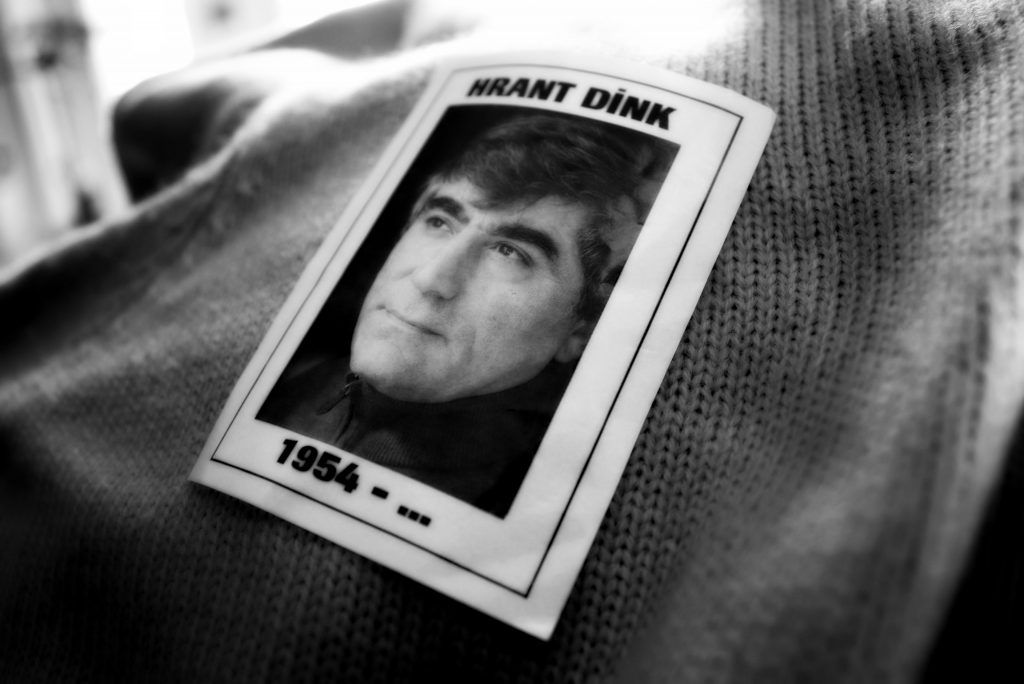“Today we remember the 10th anniversary of Hrant Dink’s assassination… and we pledge, to once and for all, topple the criminal government.” This daring and bold statement comes from Pakrad Estukian, the editor of the Armenian section of Agos newspaper, whose founder and editor, Hrant Dink, was gunned down in front of its offices on Jan. 19, 2007.

‘Dink’s murder became that singular turning point for the Turkish-Armenian community…’ (Photo: Fraksyon)
Dink’s murder became that singular turning point for the Turkish-Armenian community, which, since the Genocide, had been seeking its rightful place in Turkish society and immediately grew into a powerful catalyst for the empowerment of those Armenians who stayed in Turkey after the Genocide and lived under the yoke of oppression and injustice.
Yet the injustice of the assassination also resonated beyond the Armenian community in Turkey and became a uniting force—and rallying cry–for those segments of Turkish society that yearned for democracy and respect for human rights. The fact that tens of thousands of the people spilled into the streets of Istanbul with the slogan “We are All Hrant Dink” spoke volumes of the oppression plaguing not just minorities in Turkey, but the larger Turkish society.
In his humble and understated manner, Dink was able to challenge the Turkish government’s intolerance and became one of the first modern-day Armenian writers to use the term Armenian Genocide. His outspokenness earned him praise from around the world, but also was charged for “insulting Turkishness” and received a six-month suspended sentence.
During the past ten years, we have also witnessed the inner-workings of the quagmire that is the Turkish justice system, which has not been able find the guilty party(ies) to the murder. The reason for this farce has been the sheer fact that the judiciary in Turkey operates on the whims of the country’s president, Recep Tayyip Erdogan, whose alliances du-jour determine the guilt or innocence of criminals.
First there was a lone gunman theory, then the crime was blamed on Ergenekon, known as Turkey’s deep state, and now that Erdogan has declared war on the Gulen movement, whose members led the security forces at the time of Dink’s assassination, the court is hearing evidence that the state’s security forces ordered the hit—a conclusion that could have been reached from the onset.
However, it can be said that Dink’s tenacity and his belief that, above all else, justice must prevail set a precedent that has guided Armenians in Istanbul, and throughout Turkey, to advance certain national issues that were once deemed taboo within Turkish society.
The Nor Zartonk movement, which sprung up as a direct result of the Dink assassination, has been able to successfully advance issues of importance to the Armenian community in Turkey, one of the most visible of which was the return of Camp Armen to its rightful owners—the Armenian community.
Emboldened by Dink and his relentless advocacy, someone like Garo Paylan has emerged as the torchbearer of a movement that not only advances Armenian Genocide recognition by Turkey, but also advocates for democratic norms, equality and human rights for all minorities. As a parliament member representing the Peoples’ Democratic Party (HDP), this perch has allowed the words Armenian Genocide to be uttered from the dais of the Turkish legislature and he has loudly presented the case for basic human rights for the Kurdish population in Turkey.
Yet, as the saying goes, the more things change the more stay the same. The current climate in Turkey is extremely oppressive. Using the July coup as a cover, Erdogan and his regime have accelerated their policy of persecution of dissent and minorities, throwing thousands in jail and shutting down media outlets. Just this past weekend, Paylan was suspended for three parliamentary sessions for, once again, addressing the issue of Genocide during a legislative debate on constitutional reforms.
Possibly, the most significant legacy of Dink’s murder was the unifying effect it had on Armenians throughout the world, be they in Armenia, Artsakh (Nagorno-Karabagh/NKR), oor the Diaspora. It created a window, through which the plight of the Armenians in Turkey became as critical an aspect in our national agenda, adding an important priority and a consequential voice to the pursuit of the Armenian Cause.
It also emboldened Armenians in Turkey to reclaim their national aspirations and advance our collective cause where it counts—in Turkey, whose government still denies the Armenian Genocide and persecutes and prosecutes those who stand up for truth and justice.
Dink’s crusade and his untimely death also have allowed his successor, Pakrad Estukian, to mark the anniversary of his death calling for a collective effort to “topple” the criminal regime in Turkey.
On this day, let us pledge to advance Dink’s cause of fighting injustice and advancing human rights.
Ara Khachatourian’s editorial was originally published in Asbarez newspaper (English) on Jan. 18.
Source: Armenian Weekly
Link: Khachatourian: A Decade After Hrant Dink’s Assassination
